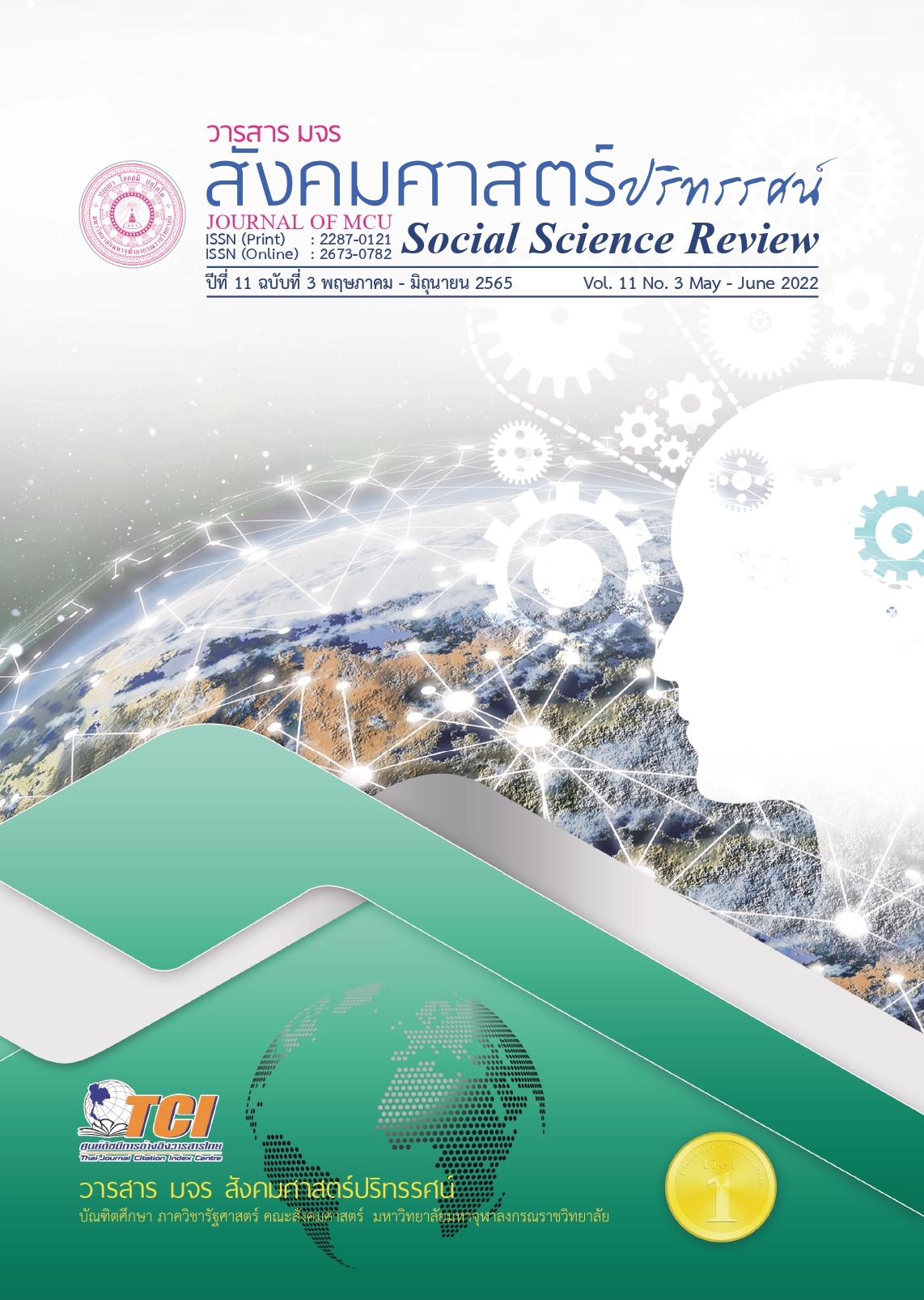นโยบายการจัดการทรัพยากรทางทะเลและชายฝั่งในประเทศไทย
คำสำคัญ:
นโยบายสาธารณะ, ทรัพยากรทางทะเลและชายฝั่ง, การจัดการทรัพยากรบทคัดย่อ
ทรัพยากรทางทะเลและชายฝั่งเป็นของทุกคน ภาครัฐซึ่งเป็นตัวแทนของประชาชนได้ทำการกำหนดนโยบายด้านทรัพยากรทางทะเลและชายฝั่งขึ้น บทความนี้จึงนำเสนอข้อมูล ดังนี้ 1) พัฒนาการของนโยบายการจัดการทรัพยากรทางทะเลและชายฝั่งในแผนพัฒนาเศรษฐกิจและสังคมแห่งชาติ ฉบับที่ 1 -12 มีทั้งช่วงที่สนับสนุนการนำทรัพยากรมาใช้เพื่อประโยชน์ทางเศรษฐกิจแต่เพียงอย่างเดียว ช่วงที่ส่งเสริมการอนุรักษ์ทรัพยากรและการมีส่วนร่วมของชุมชนชายฝั่งในการจัดการทรัพยากร 2) นโยบายการจัดการทรัพยากรทางทะเลและชายฝั่งในปัจจุบัน มีการบังคับใช้พระราชบัญญัติส่งเสริมการจัดการทรัพยากรทางทะเลและชายฝั่ง พ.ศ. 2558 และออกระเบียบต่าง ๆ เพื่อนำไปปฏิบัติ ก่อให้เกิดการยกระดับการมีส่วนร่วมของชุมชนชายฝั่งและองค์กรปกครองส่วนท้องถิ่นในการจัดการทรัพยากร ตั้งแต่การให้ข้อมูลข่าวสาร การรับฟังความคิดเห็น การร่วมวางแผนกำหนดแนวทางการดำเนินงาน การร่วมปฏิบัติ ติดตามผล แต่ในหลายเรื่องชุมชนไม่มีอำนาจตัดสินใจในการดำเนินมาตรการที่จำเป็นและเหมาะสมกับตัวเอง จึงควรมีการทบทวน ประเมินผล และปรับปรุงนโยบายเพื่อยกระดับการมีส่วนร่วมให้เป็นการจัดการร่วมระหว่างภาครัฐและชุมชนชายฝั่ง
เอกสารอ้างอิง
กรมทรัพยากรทางทะเลและชายฝั่ง. (2564). เกี่ยวกับเรา กรมทรัพยากรทางทะเลและชายฝั่ง. สืบค้น10 กรกฎาคม2564, จาก https://www.dmcr.go.th/aboutus/ab
กรมสนธิสัญญาและกฎหมาย. (2548). อนุสัญญาสหประชาชาติว่าด้วยกฎหมายทะเล ค.ศ. 1982. กรุงเทพฯ: เอราวัณการพิมพ์.
คณะอนุกรรมการจัดการความรู้เพื่อผลประโยชน์แห่งชาติทางทะเล. (2562). ทะเลและมหาสมุทรและผลประโยชน์ของชาติทางทะเล. กรุงเทพฯ: สำนักพิมพ์คณะรัฐมนตรีและราชกิจจานุเบกษา.
นรากร นันทไตรภพ. (2563). รายการร้อยเรื่องเมืองไทย เรื่อง ทรัพยากรทางทะเลและชายฝั่ง. สืบค้น 1 สิงหาคม2564, จาก https://shorturl.asia/oS4GW
ปธาน สุวรรณมงคล. (2551). “นโยบายด้านทรัพยากรและสิ่งแวดล้อม” ใน ประมวลสาระชุดวิชาปัญหาเฉพาะเชิงนโยบายสาธารณะ หน่วยที่ 9-15. นนทบุรี: สำนักพิมพ์มหาวิทยาลัยสุโขทัยธรรมาธิราช.
เพ็ญนภา สวนทอง และโอฬาร ถิ่นบางเตียว. (2562). นิเวศวิทยาการเมืองของการจัดการทรัพยากรทางทะเลอ่าบ้านดอนจังหวัดสุราษฎร์ธานี. วารสารเศรษฐศาสตร์การเมืองบูรพา, 7(2), 101-130.
มยุรี อนุมานราชธน. (2549). นโยบายสาธารณะ. กรุงเทพฯ: เอ็กซ์เปอร์เน็ท.
ศุภชีพ จินดารัตน์ และประจวบ ทองศรี. (2564). การวิเคราะห์สภาพปัญหาการจัดการทรัพยากรทางทะเลของกลุ่มประมงพื้นบ้านชุมชนแหลมนก ตำบลบานา อำเภอเมือง จังหวัดปัตตานี. ใน การประชุมวิชาการระดับชาติและนานาชาติด้านมนุษยศาสตร์และสังคมศาสตร์ ครั้งที่ 2 (น. 53-64). สงขลา: มหาวิทยาลัยทักษิณ.
สยาม อรุณศรีมรกต และยงยุทธ วัชรดุลย์. (2559). เป้าหมายการพัฒนาที่ยั่งยืน 17 ประการของสหประชาชาติเพื่อโลกอนาคต. วารสารวิจัยสหวิทยาการไทย, 11(3), 1-7.
สำนักงานสภาพัฒนาการเศรษฐกิจและสังคมแห่งชาติ. (2525). แผนพัฒนาเศรษฐกิจและสังคมแห่งชาติ ฉบับที่ 5 (พ.ศ. 2525-2529). สืบค้น 15 กรกฎาคม 2564, จาก https:// www.nesdc.go.th/ewt_dl_link.php?nid=3780
อรทัย อินต๊ะไชยวงค์ และบรรเจิด สิงห์คะเนติ. (2562). สิทธิชุมชนในการจัดการทรัพยากรและสิ่งแวดล้อมอย่างสมดุลและยั่งยืน: ศึกษาความเหมาะสมของการใช้ทฤษฎีของ Elinor Ostrom ในประเทศไทย. วารสารดุษฎีบัณฑิตทางสังคมศาสตร์, 9(1), 182-192.
อริยพร โพธิใส. (2560). มาตรการและแนวทางป้องกันปัญหาการทำประมงผิดกฎหมายของประเทศไทยกับหลักการสำคัญของ IUU Fishing. วารสารจุลนิติ, 14(4), 149-161.
อวิการัตน์ นิยมไทย. (2558). กฎหมายเกี่ยวกับการส่งเสริมการบริหารจัดการทรัพยากรทางทะเลและชายฝั่ง. วารสารจุลนิติ, 12(4), 155-163.
อุดมศักดิ์ สิทธิพงษ์. (2560). มาตรการทางกฎหมายในการบริหารจัดการทรัพยากรทางทะเลและชายฝั่งตามพระราชบัญญัติส่งเสริมการจัดการทรัพยากรทางทะเลและชายฝั่ง พ.ศ. 2558. วารสารนิติศาสตร์ มหาวิทยาลัยนเรศวร, 10(1), 141-165.
Ostorm, V. & Ostrom, E. (1971). Public Choice: A Different Approach to the Study of Public Administration. Public Administration Review, 31(2), 203-216.
Ostrom, E. (1990). Governing the commons: The evaluation of institutions for collective action. Cambridge, UK: Cambridge University Press.
ดาวน์โหลด
เผยแพร่แล้ว
รูปแบบการอ้างอิง
ฉบับ
ประเภทบทความ
สัญญาอนุญาต
ลิขสิทธิ์ (c) 2022 วารสาร มจร สังคมศาสตร์ปริทรรศน์

อนุญาตภายใต้เงื่อนไข Creative Commons Attribution-NonCommercial-NoDerivatives 4.0 International License.
เพื่อให้เป็นไปตามกฎหมายลิขสิทธิ์ ผู้นิพนธ์ทุกท่านต้องลงลายมือชื่อในแบบฟอร์มใบมอบลิขสิทธิ์บทความให้แก่วารสารฯ พร้อมกับบทความต้นฉบับที่ได้แก้ไขครั้งสุดท้าย นอกจากนี้ ผู้นิพนธ์ทุกท่านต้องยืนยันว่าบทความต้นฉบับที่ส่งมาตีพิมพ์นั้น ได้ส่งมาตีพิมพ์เฉพาะในวารสาร มจร สังคมศาสตร์ปริทรรศน์ เพียงแห่งเดียวเท่านั้น หากมีการใช้ภาพหรือตารางหรือเนื้อหาอื่นๆ ของผู้นิพนธ์อื่นที่ปรากฏในสิ่งตีพิมพ์อื่นมาแล้ว ผู้นิพนธ์ต้องขออนุญาตเจ้าของลิขสิทธิ์ก่อน พร้อมทั้งแสดงหนังสือที่ได้รับการยินยอมต่อบรรณาธิการ ก่อนที่บทความจะได้รับการตีพิมพ์ หากไม่เป็นไปตามข้อกำหนดเบื้องต้น ทางวารสารจะถอดบทความของท่านออกโดยไม่มีข้อยกเว้นใดๆ ทั้งสิ้น





